|
قصة الصحافة العربية في مصر منذ نشأتها حتى منتصف القرن العشرين المؤلف: عبد اللطيف حمزة الناشر: دار الفكر العربي عدد الصفحات: 220 الطبعة: الثانية 1985 |
لحظة تاريخية فارقة مثَّلت الميلاد الحقيقي للصحافة المصرية والعربية، يوم أن أصدر مؤسس مصر الحديثة وحاكمها الأشهر محمد علي باشا، مرسومه بإنشاء أول صحيفة رسمية مصرية خالصة باسم "الوقائع المصرية" في ديسمبر/كانون الأول 1828. فما قبل هذا التاريخ لم يكن إلا إرهاصات، وما بعده لم يكن إلا بناء عليه.
"الوقائع" كانت بداية قصة شارفت على قرنين من الزمان، حاول مؤلف هذا الكتاب أن يرصد معالمها الأساسية، وأن يتوقف عند محطاتها الرئيسية، منذ النشأة إلى قيام ثورة يوليو/تموز 1952، مما أكسب الكتاب أهمية كبيرة بين دارسي تاريخ الصحافة المصرية، حتى أصبح من المراجع الكلاسيكية في هذا الميدان المتشعب.
المؤلف عبد اللطيف حمزة،هو أحد رموز الصحافة في مصر، عمل مدرسا بجامعة القاهرة، وتولى رئاسة قسم الصحافة بكلية الآداب عام 1956، ثم اختير أستاذا لكرسي الفن الصحفي، كما عمل رئيسا لقسم الصحافة بجامعتي بغداد وأم درمان، وأستاذا زائرا في عدد من دول العالم منها أميركا واليابان وفرنسا، كما أنشأ هيئة خريجي الصحافة في مصر عام 1958، وأسهم في تأسيس كلية الإعلام بجامعة القاهرة عام 1970، وكذلك أنشأ قسم الصحافة والإعلام بجامعة أم درمان.
وعبر مقدمة و17 فصلا، يرصد حمزة تطور مسيرة الصحافة في مصر التي عرفت المطبعة متأخرا نسبيا عن بلاد المشرق في الأستانة وسوريا ولبنان، كما يركز على الظروف السياسية التي نشأت فيها الصحف المصرية والأطوار التي مرت بها، وكيف تعامل معها الحكام والمستعمر الأجنبي، وجهودها في مواجهة الاحتلال الإنجليزي، والدور الكبير الذي لعبه بعض المفكرين في دفع الصحافة إلى الأمام وتحريرها من الدوران في فلك السلطة.
يلقي المؤلف الضوء على سياقات ظهور الصحافة الأهلية وحال الصحف بعد الثورة العرابية، ودورها بعد ثورة 1919، كما يقدم رصدا لحالة الصحف بعد الحرب العالمية الثانية، وأهم الصحف الصادرة في هذه المرحلة.
إرهاصات الميلاد
ارتبطت الصحافة دوما بالطباعة، وقد كانت مطبعة البطاركة في حلب أول مطبعة عربية، حيث أنشئت عام 1702، ولم يسبقها في منطقة الشرق إلا مطابع الأستانة. ثم توالت المطابع المهمة في بلاد الشام، ومنها مطبعة دير مار يوحنا بقرية الشوير في جبل لبنان، والتي أنشأها الشماس عبد الله الزاخر عام 1733، ثم مطبعة الكاثوليك عام 1750، وصولا إلى مطبعة الآباء اليسوعيين منتصف القرن التاسع عشر. ورغم أهمية الدور التنويري لهذه المطابع فإنها لم تساهم في طبع الصحف، واقتصرت على طباعة كتب التراث الديني والمعاجم العلمية.
ومع أن إنشاء المطبعة الأميرية (بولاق) عام 1821 تأخر نسبيا مقارنة بالمطابع الشامية، فإن الصحافة المصرية سبقت هذه البلدان. فبعد أن تعرف المصريون إلى الصحف من خلال الحملة الفرنسية التي استمرت ثلاث سنوات ما بين عامي 1798 و1801، اصطحب الجنرال نابليون بونابرت إلى مصر مطبعة مزودة بالحروف اللاتينية والعربية، لطباعة البيانات الرسمية والأوامر الحكومية التي يتوجه بها إلى المصريين.
وتولت مطبعة الحملة مهمة إصدار صحيفتين باللغة الفرنسية هما "لاديكار" و"لوكوريير" استهدفتا جنود الحملة، بينما كانت صلتهما مقطوعة بالشعب المصري بسبب حاجز اللغة. فلما خرجت الحملة الفرنسية، أخذت معها مطبعتها لتظل مصر بدون مطبعة، إلى أن أمر محمد علي بإنشاء مطبعة بولاق لنشر المراسيم الحكومية، قبل أن تتولى لاحقا طبع صحيفة "الوقائع المصرية".
نشأة في ظل السلطة
يرى المؤلف أن الظروف السياسية والاجتماعية والبيئة الفكرية والثقافية المواتية ساهمت إلى حد كبير في تطور الصحافة، فمجيء الحملة الفرنسية ثم تولي محمد علي مقاليد حكم مصر وحرصه على إعداد كوادر مصرية في جميع المجالات لاسيما العسكرية والصناعية، ورعايته للبعثات الخارجية وبدء حركة الترجمة.. كل ذلك وفر مناخا مناسبا لصحافة قوية لها أثرها في نشر قرارات السلطة ومراسيمها.
وكان من الطبيعي أن تكون الريادة والأولية للصحف الرسمية التي صدر منها في عهد محمد علي -إضافة إلى "الوقائع"- "جورنال الخديوي" و"الجريدة العسكرية" التي كانت تصدر كل يومين، واقتصرت مادتها على نشر الجرائم التي تقع داخل الوحدات العسكرية، والعقوبات الصادرة ضد مرتكبيها.
كما صدر منها في عهد إسماعيل باشا الذي تولى حكم مصر بين عامي 1863 و1879 صحيفة "روضة المدارس" التي تخصصت في أخبار التلاميذ والامتحانات، و"يعسوب الطب" التي تعتبر أقدم جريدة طبية متخصصة في الشرق العربي كله إذ صدرت عام 1865. ويشير المؤلف إلى أن هذه الصحف صُنعت على أعين الحكام وعاشت بأموالهم وخضعت لتوجيهاتهم، ولم يكن لها هدف غير إرضاء الحكام.
ورغم ظهور عدد من الصحف الأهلية فإنها أيضا كانت دائرة في فلك السلطة وتصدر بوحي من الحكام ورعايتهم، فهي تعتبر صحفا شبه رسمية. ومن أمثلة ما صدر منها في عهد إسماعيل باشا، صحف "وادي النيل" و"نزهة الأفكار" و"روضة الأخبار".
وأحيانا صدرت صحف أهلية تمثل السلطان العثماني، ومنها صحيفة "السلطنة" التي صدرت عام 1857، وكانت لسان حال السلطان عبد المجيد الثاني، تدافع عنه ضد الخديوي محمد سعيد باشا (حكم من 1854 إلى 1863) بسبب جهوده الإصلاحية المتوالية التي أوجدت حالة من العداء بينه وبين السلطان.
حقبة ذهبية
مثَّل ظهور السيد جمال الدين الأفغاني في مصر ومكثه بها من عام 1871 حتى 1876، نقطة فاصلة في نهضة الصحافة وتطورها. ويعتبر المؤلف أن جهود الأفغاني نقلت الصحافة من طور النشأة إلى طور الفتوة والشباب، فقد كان الرجل يحرّض تلاميذه الموهوبين على الكتابة وإصدار الصحف لمواجهة الاستعمار الأوروبي والاستبداد الداخلي، فشهدت مصر ازدهارا في عدد الصحف الأهلية، كما شهدت تطورا كبيرا في أساليب التحرير والصياغة.
وخلال السنوات السبع الممتدة من 1875 حتى 1882، ظهر عدد من الصحف المهمة، منها على سبيل التمثيل: الأهرام، الوطن، مصر، التجارة، أبو نظارة، مرآة الشرق، مصر الفتاة، مصر القاهرة، البرهان، الطائف، المفيد، التنكيت والتبكيت.
ويشير المؤلف إلى أن صحيفة "الوقائع" عاشت أزهى عصورها بين عامي 1880 و1881، عندما تولى تحريرها الشيخ محمد عبده الذي وضع لها نظاما حديثا في الإدارة والتحرير، وقصر لغتها على العربية وحدها، وابتعد بها عن الطابع الرسمي، فزخرت بالمقالات الاجتماعية والفلسفية والدينية، وشاركت بقوة في حركة الإصلاح الصاعدة.
ويتوقف المؤلف أمام الدور الكبير لجريدة "الأهرام" التي أسسها في الإسكندرية لبنانيان هما سليم وبشارة تقلا، واشترطت عليهما نظارة الخارجية ألا يخوضا في السياسة، فالتزما بذلك حتى اندلعت الحرب التركية الروسية، فتناولتها "الأهرام" كغيرها من الصحف المصرية، إلى أن انتهت الحرب وأصبحت البلاد المصرية موضوعا للمساومات خلال مفاوضات الصلح بين تركيا ودول أوروبا، وهو ما مثل دافعا للصحف المصرية لتناول موضوع جديد تماما عليها هو وضع مصر الدولي، فاتسع المجال الصحفي واتسعت الفرصة للتأثير في الرأي العام، وعاد كل ذلك على الصحف الأهلية بالنضج الحقيقي وإدراك واجب الصحفي تجاه قضايا وطنه.
مع الثورات
يرصد المؤلف دور الصحافة في التمهيد للثورة العرابية التي بدأت وقائعها خلال العام 1879 واستمرت لأكثر من ثلاث سنوات، فقد أسخطت الصحف المصرية الرأي العام على الأوضاع السياسية والاقتصادية وإسناد الوظائف العليا في الجيش إلى الأتراك الشراكسة على حساب المصريين. وقد اعتمدت الثورة العرابية على تأييد صحيفتي "الطائف" لعبد الله النديم، و"المفيد" لحسن الشمسي.
كما يتوقف المؤلف عند تضييق الاحتلال الإنجليزي على الصحافة لاسيما بعد انتهاء الثورة العرابية، فقد أمر ناظر الداخلية في ديسمبر/كانون الأول 1882 بإلغاء جرائد الزمان والسفير والطائف والنجاح والمفيد التي قبض على رئيس تحريرها حسن الشمسي، ونُفي محمد عبده إلى باريس واختفى عبد الله النديم عشر سنوات، مما أدخل الصحافة في حالة من اليأس والإحباط.
لكن الصحافة قامت من كبوتها وانفكت من أسرها إلى درجة أن الجمع بين زعامة السياسة ورئاسة الصحف أصبح سمة للعصر، فالشيخ علي يوسف صاحب جريدة "المؤيد" هو في الوقت عينه رئيس حزب الإصلاح المنادي بالمبادئ الدستورية، والزعيم الوطني مصطفى كامل هو صاحب جريدة اللواء المنددة بمظالم الاحتلال البريطاني.
وخلال الفترة من 1889 حتى 1914، صدرت عدة صحف أخذت على عاتقها مواجهة الاحتلال والمطالبة بالاستقلال، من أهمها: "الأستاذ" لعبد الله النديم، والجريدة لأحمد لطفي السيد عام 1907، و"الشعب" لأمين الرافعي، عام 1913.
أما ثورة 1919، فقد اندلعت والأحكام العرفية مطبقة على الصحف المصرية، ورغم ذلك حاولت بعض الصحف تأييد الثورة ولو بقدر كبير من الاحتياط والتحفظ، ومنها جريدة الأهرام التي اهتمت برد مزاعم الاحتلال حول وصف الثوار بالتطرف.
كما مهدت الصحف -برأي المؤلف- الطريق أمام قيام ثورة يوليو/تموز 1952، وقد مثلت بعض الإصدارات الصحفية شوكة في حلق العهد الملكي، ولاسيما صحف حركة "مصر الفتاة" بزعامة أحمد حسين الذي كتب أقوى المقالات في نقد النظام الاجتماعي السائد، وشاركه في الكتابة فتحي رضوان ونور الدين طراف.
ويشير المؤلف إلى الأثر الكبير لصحيفة "الإخوان المسلمون" التي أصدرها الشيخ طنطاوي جوهري أسبوعيا عام 1933، قبل أن ينتقل امتيازها إلى مؤسس الجماعة ومرشدها حسن البنا الذي أصدرها بصفة يومية.








































